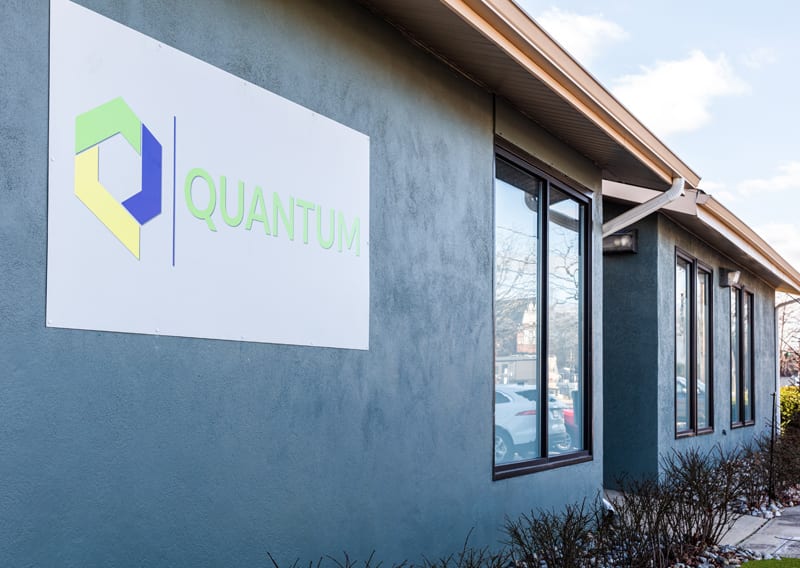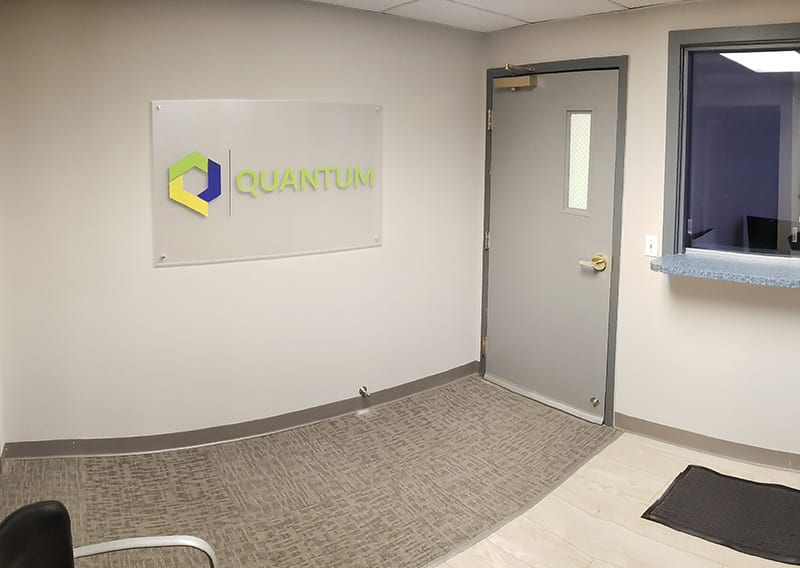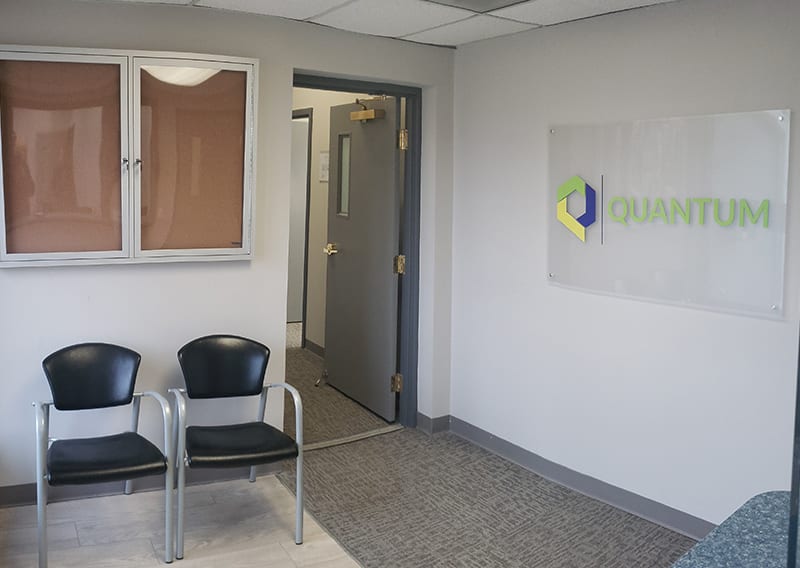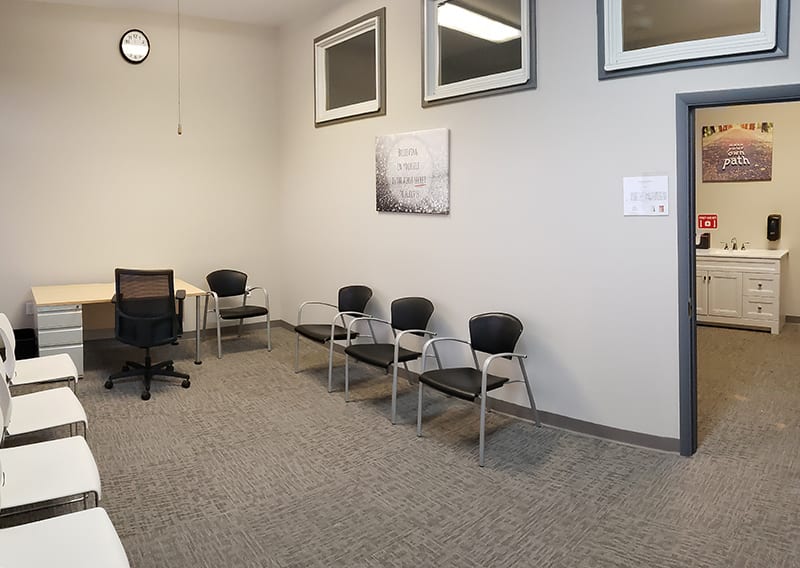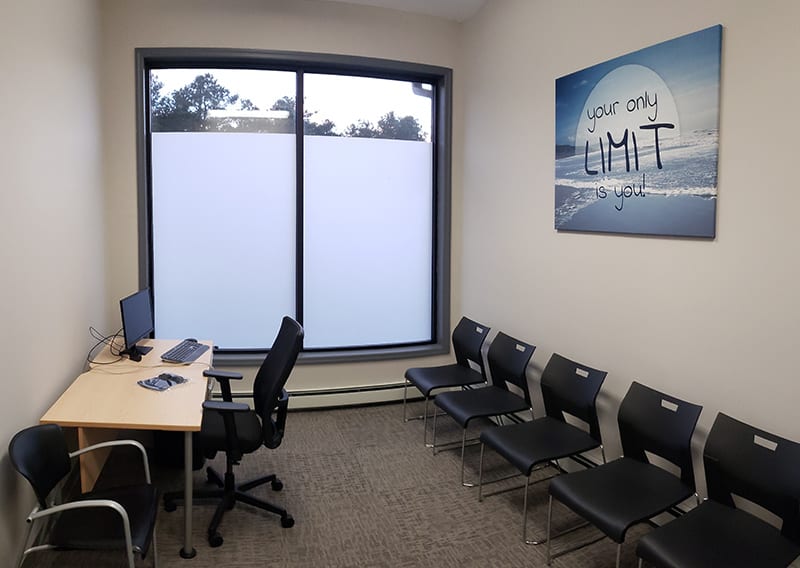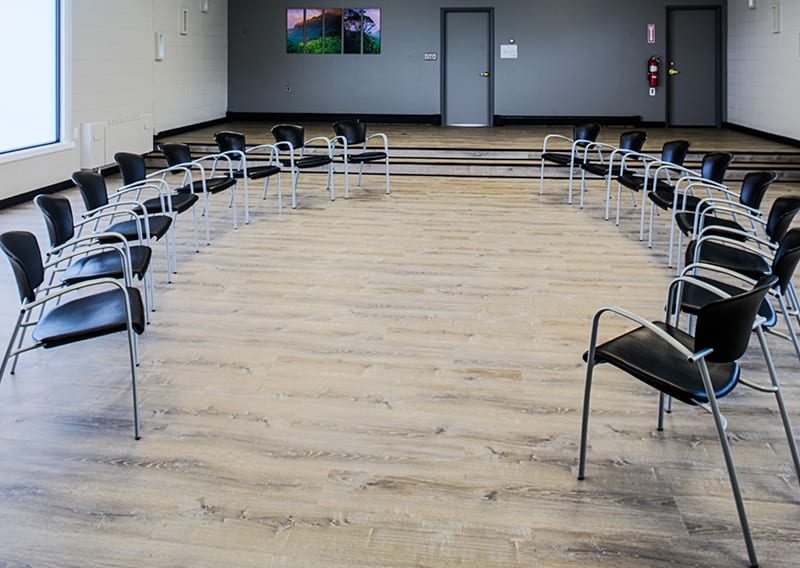Our facility is a warm, inviting, cozy, and secure environment that provides the perfect level of safety, comfort, and privacy as you receive treatment and get on your path to wellness. We’ve designed our space to allow for a low-stress environment where you can focus on your well-being.
Given the concerns of the COVID pandemic, we’re ensuring procedures are followed to create a clean environment for our patients, staff, and visitors. We’ve gone above and beyond CDC and New Jersey State guidance to design our cleaning and disinfecting protocol so that there is no question of the cleanliness and safety of our facility.
You’re here to get well and our priority is maintaining a safe, clean, peaceful, and welcoming environment for you to do just that.
To see our response to Covid-19, click here.
Photo Gallery
Click photos to enlarge
Are You Ready to Begin Your Journey to Recovery?
You could be completely covered. Verify Your Insurance Today.
The Quantum
Process Outpatient Rehab NJ
1. Make the Call
Contact our Quantum Team at
(609) 993 – 0733 to get started.
2. Complete
Your Intake
This streamlined process includes a series of questions and discussion of your unique needs and goals.
3. Get the Best Care Team Possible
After your intake, you’ll meet your Care Team, a group of amazing professionals dedicated to helping you make recovery reality.
4. On-Going Support
After you meet your Care Team, you’ll start to receive treatment based on a Care Plan that’s designed to help you achieve and sustain your recovery.
The Quantum
Process Outpatient Rehab NJ
1. Make the Call
Contact our Quantum Team at
(609) 993 – 0733 to get started.
2. Complete
Your Intake
This streamlined process includes a series of questions and discussion of your unique needs and goals.
3. Get the Best Care Team Possible
After your intake, you’ll meet your Care Team, a group of amazing professionals dedicated to helping you make recovery reality.
4. On-Going Support
After you meet your Care Team, you’ll start to receive treatment based on a Care Plan that’s designed to help you achieve and sustain your recovery.
- Why Choose Quantum Behavioral Health
- Highest Rated Alcohol Detox Program
- Drug Detox Program
- Top Alcohol Rehab in Newark
- Drug Rehab in Newark
- How Much Does Rehab Cost in Newark?
- How Long Is Detox?
- How Long Is Rehab?
- 30 Day Short Term Rehab
- Long Term Rehab (60 – 90 Days)
- Additional Therapies & Addiction Treatments Available
- Does My Insurance Have Coverage for Rehab?
- MAT
- Cognitive Behavioral Therapy
- Dialectical Behavioral Therapy
- Rational Emotive Behavioral Therapy
- Dual Diagnosis Treatment
- EMDR
- Relapse Prevention
- Life Skills Training
- Vocational Training
- Group Therapy
- Experiential Therapy
- One on One Therapy
- Family Therapy
- Trauma Informed Therapy
- Physical Fitness
- Off Site Activities
- Holistic Addiction Treatment in Newark
- Anxiety Disorder
- Bipolar Disorder
- Borderline Personality Disorder
- Codependency
- Depression
- Impulse Control Disorder
- Post-Traumatic Stress Disorder
- Alcohol & Drug Rehab for Active Military Members & Veterans
- Stresses of Military Life for Active Service & Family Members
- Specialized Addiction Treatment for Military Service Members & Veterans
- PTSD
- Mental Health Services for Military Members & Veterans
- Why Choose Quantum Behavioral Health for Detox & Rehab in Newark?
Why Choose Quantum Behavioral Health
A top rehab for residents of Newark, New Jersey, Quantum Behavioral Health offers clinically driven drug and alcohol treatment programs. Substance abuse problems like a heroin addiction or alcohol addiction won’t get better without help. Our addiction recovery programs are based on sound, medically sanctioned addiction treatments like cognitive behavioral therapy and dialectical behavior therapy that have been proven to work. We also offer alternative and holistic therapies that complement our evidence-based treatments and enhance the recovery process. We can help you learn how to manage your drug or alcohol along with any underlying mental health condition you may be experiencing. Let us help you protect your health and future.
Jersey residents struggling with drug or alcohol addiction choose Quantum for our personalized outpatient treatment programs and cooccurring mental health disorders treatment. Our treatment programs have a strong relapse prevention component, and we offer multiple levels of care on an outpatient rehab basis. Unlike inpatient rehab, outpatient treatment offers clients the flexibility they need to maintain their responsibilities at home or work if they choose while still obtaining the life-changing alcohol and drug treatment programs they need to manage their substance abuse disorder.
Highest Rated Alcohol Detox Program
Many people require alcohol detox before beginning their addiction treatment program. Although Quantum does not offer alcohol detox, we can refer clients to our network partners near Newark, NJ, who do. Some of our area partners offer a full continuum of care that includes alcohol and drug detox programs. Our network rehab centers share our values for customized treatment programs and empathetic care.
Drug Detox Program
Quantum can refer clients who are searching for drug detox in Newark, NJ, to our network partners who offer detox programs. We specialize in outpatient programs at our treatment facility. Many clients may need detox before they are stable enough to begin their substance abuse treatment. After completing medical detox, clients often transition to our recovery center to enroll in our partial care or intensive outpatient treatment program.
Top Alcohol Rehab in Newark
It’s not easy to manage an alcohol addiction. Alcohol is seemingly everywhere. It’s sold at sports stadiums, concert venues, restaurants, and even supermarkets. And yet, with high-quality alcoholism treatment, clients can end their dependence on alcohol and achieve their sober living goals. We help clients manage their alcohol addiction with proven evidence-based therapies like cognitive behavioral therapy. We also introduce clients to 12 step program principles so that they can attend aftercare programming at Alcohol Anonymous meetings near their Newark or Jersey City home after completing their treatment at Quantum. Our recovery center programs also include holistic therapies that support lasting recovery.
Drug Rehab in Newark
An opiate addiction, crystal meth addiction, or any types of drug addictions will erode a person’s physical and mental health over time–or all at once should overdose occur. While overcoming a drug abuse problem can seem overwhelming, our rehab in New Jersey helps clients to gradually heal and learn how to manage their addiction. Because many people also have a dual diagnosis, we also provide mental health / behavioral health treatment to ensure clients get the support they need. During our rehab programs, clients can expect to spend time in group therapy and individual therapy. We combine evidence based and holistic treatments to help clients build a well-rounded recovery foundation.
How Much Does Rehab Cost in Newark?
The cost of drug and alcohol addiction treatment varies depending on the level of care a client needs and how long they spend in treatment. Residential treatment typically involves greater cost because clients reside at their rehab for the duration of their addiction treatment program. The out-of-pocket costs will also vary depending on whether or not the individual has insurance coverage and the nature of that coverage. When you contact our treatment facility, we can discuss the costs related to your specific recommended treatment plan.
How Long Is Detox?
Detox programs generally last for about one week, but many people require more time to complete the process depending on the nature of their addiction and their own unique chemistry. A person who hasn’t been chemically dependent on drugs or alcohol for very long may complete the detox process more quickly. Someone dependent on an addictive substance for years may require more time to detox thoroughly and then be ready to begin the next phase of their drug or alcoholism treatment.
How Long Is Rehab?
Drug and alcohol rehab programs may last 30 days or longer. Many addiction treatment centers like ours offer flexible programming. Clients often transition from a highly supportive program like partial hospitalization programs to less intensive programs like regular outpatient treatment as they grow in stability and become more successful at managing their triggers. Addiction recovery extends beyond rehab, so the longer a person remains getting treatment, the more support they’ll have to rely on as they rebuild their lives.
30 Day Short Term Rehab
Spending 30 days in a recovery program is usually the minimum time needed to learn strategies that can help a person manage their addiction to drugs and alcohol. During this type of rehab program, clients can expect to participate in group therapy sessions and one-on-one counseling sessions. These sessions encompass many different treatment modalities, including medically sanctioned therapies and holistic treatments. Short-term rehab may not be best for all clients. Clients who have abused drugs or alcohol for a long period of time or who are also suffering from a cooccurring mental disorder may want to spend more time in formal treatment to ensure they can manage their condition(s) effectively.
Long Term Rehab (60 – 90 Days)
Research has demonstrated that the longer an individual spends in substance abuse treatment, the less likely they are to relapse. Drugs and alcohol can be tremendously addictive. Learning how to manage an addiction takes time. Clients must develop strategies for managing their individual triggers to abuse drugs and alcohol. About one-third of people who have addictions also have a mental health disorder. Long-term rehab is a good option for people with simultaneous conditions who need time and support to manage both disorders.
Additional Therapies & Addiction Treatments Available
Quantum’s alcohol and drug addiction treatment programs include evidence-based therapies, but we also feature alternative therapies and holistic treatments that are known to enhance the recovery process too. While enrolled in partial hospitalization programs or outpatient programs, clients may include treatments such as family therapy, art therapy, health awareness, and mindfulness as part of their individualized rehab program. When enrolling at our alcohol and drug rehab, clients can meet with an addiction specialist to discuss the ideal treatment plan for their needs.
As clients near the completion of their programs, we also make sure they’re aware of aftercare resources in Newark, NJ, like Alcoholics Anonymous or Narcotics Anonymous groups that can provide ongoing support for their continued recovery journey.
Does My Insurance Have Coverage for Rehab?
New legislation has mandated insurance providers to cover treatment of mental health disorders and substance use disorders. However, that coverage varies between providers and from one insurance plan to another. Our enrollment treatment will perform insurance verification tasks, explain coverage, and answer any questions you may have about the cost of alcohol and drug treatment based on your rehab plan and insurance coverage. If you are unsure about your medical insurance plan’s coverage for rehab centers in Newark, contact us for assistance.
MAT
Medication assisted treatment MAT is a helpful form of drug and alcohol addiction treatment for some clients. Medicationassisted treatment refers to the medications that clinicians offer some clients who can benefit from medication therapy. People suffering from opioid addiction and alcohol addiction, in particular, often respond well to this form of treatment that’s designed to reduce cravings to use the substance in question. In some cases, medications can also block withdrawal symptoms. When enrolling for treatment, clinicians can help you determine if medication assisted treatment is the best option for you. MAT doesn’t cure substance use disorders. It only helps clients to manage their cravings so that they can more easily focus on their other addiction treatments and ward off relapse.
Cognitive Behavioral Therapy
A form of talk therapy, cognitive behavioral therapy is an evidence-based treatment that helps clients identify the connections between their emotions, thoughts, and behaviors. By becoming more mindful of their unhealthy thoughts and negative emotions, clients can prevent them from triggering relapse or other unhealthy behaviors. Cognitive behavioral therapy is a leading addictions treatment and offered in both inpatient rehab and outpatient rehab settings.
Dialectical Behavioral Therapy
Dialectical behavioral therapy is closely related to cognitive behavioral therapy. However, this form of therapy focuses on distress tolerance. Clients learn strategies for tolerating and coping with their negative emotions without turning to drugs and alcohol. With improved emotional regulation, clients can more easily maintain their recovery journey. Our treatment center provides this evidence-based therapy as part of our evidence-based treatment offerings.
Rational Emotive Behavioral Therapy
Rational emotive behavioral therapy is also related to cognitive behavioral therapy. During these treatment sessions, therapists help clients confront their unhealthy or negative thoughts that have contributed to their unhealthy behaviors. Many people who suffer from alcohol or drug addiction may have low self esteem or insecurities, for example, that affect their beliefs and thoughts. It’s important to change these thoughts because they’re destructive and lead to dysfunctional behaviors.
Dual Diagnosis Treatment
Unfortunately, many people who have a substance abuse problem also have a mental health disorder. These mental health conditions can vary, including anything from an eating disorder and depression to generalized anxiety and post traumatic stress disorder. It’s important for clients with cooccurring disorders to get simultaneous treatment so that neither condition can negatively impact the other. Quantum offers dual diagnosis treatment that clients can include in their rehab program if needed. Treatment for dual diagnosis may include medications and therapy.
EMDR
EMDR is increasingly becoming a helpful therapy for treatment post traumatic stress disorder or helping clients who’ve experienced trauma and struggle to cope with their emotions because of it. EMDR stands for eye movement desensitization and reprocessing. The treatment changes the way a person’s stores traumatic memories in their brain. The change also makes it easier for them to cope with their distressing emotions. Improved emotional regulation is an important relapse prevention strategy.
Relapse Prevention
Some clients are at an increased risk of relapse for any number of reasons. Sometimes the drug in question is particularly addictive. Crystal meth, for instance, is associated with high relapse rates. Other clients may be more vulnerable because they’ve been involved with alcohol or drug abuse since they were teens. Relapse prevention therapy can help these clients avoid high-risk situations that could threaten their recovery progress. Therapists help clients recognize high risk scenarios and help them find ways to maintain their sobriety.
Life Skills Training
It’s not uncommon for people who’ve been addicted to powerful drugs or alcohol for a long period of time to find it difficult to lead a ‘normal’ life with its regular routines and tasks. Life skills training helps clients develop the skills they need to create healthy routines. Clients will focus on time management, improving their communication skills, and performing basic tasks of daily living that will support their continued recovery. Our therapists are committed to helping each client build a strong foundation for their continued recovery. Improved life skills make it easier for people to thrive in their post-addiction life.
Vocational Training
Unlike many other addiction treatment centers in New Jersey, Quantum provides additional support for clients in the form of vocational training. This type of training can be a valuable addiction resource for people who intend to go back to work after completing treatment or who want to change their line of work. Many people who experience powerful substance use disorders and mental health disorders haven’t worked at a traditional job in some time. We provide vocational training to help them update their skills. A career lends stable support to a client’s long-term recovery process.
Group Therapy
During addiction treatment at our recovery center, clients can expect to attend group therapy sessions that include many different treatment modalities. These sessions feature important topics related to addiction and recovery that are relevant for all clients. Led by therapists, these sessions give clients the opportunity to support one another and participate in discussions that allow them to share their thoughts and experiences. Together, clients will also learn many different strategies for managing their addictions and the behaviors that underlie them.
Experiential Therapy
It’s not unusual for some clients to find talk therapy difficult–even burdensome–as important as it is. Experiential therapy gives clients the opportunity to express themselves and work toward recovery in other ways. Therapists lead various types of activities designed to promote healing. Experiential therapy may involve a number of different methods that include art therapy, music, equine therapy, creative writing, performance, hiking, and more. Different treatment centers often base activities around local attractions like state parks, beaches, or other places for off-site experiences. Our alcohol and drug rehab offers art therapy and other forms of experiential therapy that help promote lasting recovery.
One on One Therapy
Individual therapy is crucial for a high-quality addiction rehab program as well as cooccurring mental disorders treatment. Our outpatient programs include both one-on-one therapy and group counseling sessions. Individual therapy involves many different treatment approaches, each designed to support a different aspect of recovery and addiction management. Clients can expect to meet at our alcohol and drug rehab several times each week, depending on the rehab plan they’re enrolled in, to meet with their therapists individually and to attend group therapy. Individual therapy sessions afford them the opportunity to work on issues that are specific to their situation and treatment needs.
Family Therapy
When a person has an addiction, it often impacts their family too. Willing clients and their loved ones can attend family therapy at our alcohol and drug rehab to get professional counseling to repair their damaged bonds and rebuild their relationships. Therapists help family members to understand how to best support their loved one and to understand the nature of addiction. They’ll also learn how to communicate better and to identify any unhealthy patterns of behavior like codependency that might be contributing to relationship problems. Family therapy promotes recovery for the entire family unit.
Trauma Informed Therapy
It’s not uncommon for many substance abusers to rely on drugs and alcohol to help dull the pain from past traumas. Of course, this can lead to the development of addiction. Trauma-informed therapy helps clients to confront their past traumas in a safe setting where they can work through their emotions with the guidance of a trained therapist. Unresolved emotions can be triggers for alcohol and drug abuse. Trauma-informed therapy is often featured in the treatment of post traumatic stress disorder. Although past traumas cannot be minimized or erased, clients can learn how to cope with their emotions in healthier ways and prevent their past traumas from negatively impacting their present lives and future.
Physical Fitness
Our drug and alcohol rehab offers both medically sanctioned and holistic therapies. We promote physical fitness as a holistic treatment that can enhance recovery during and after formal rehab treatment. Regardless of their fitness level, clients can benefit by including fitness activities in their daily lives. While good for health and healing, physical fitness activities also support mental health. During workouts, the body releases endorphins that go to work healing muscles and flooding the brain where they trigger a natural ‘feel-good’ effect. Working out also provides clients with a healthy activity they include in their day–an activity that replaces some of the time they used to spend abusing drugs or alcohol.
Off Site Activities
Off-site activities offer rehab clients the opportunity to take a break from conventional addiction treatment to enjoy sober-friendly activities that often have a therapeutic dimension. For example, treatment providers might organize a hike or group outing to a theater performance or movie. Fortunately, Newark, NJ, features many opportunities for off-site activities with its natural and cultural attractions. Off-site activities can help clients unwind, get to know one another, and alleviate stress.
Holistic Addiction Treatment in Newark
Quantum Behavioral Health is known for our comprehensive outpatient treatment programs that involve evidence-based therapies and holistic therapies. Holistic therapies like art therapy and experiential therapy are known to enhance recovery and provide a welcome balance to more traditional forms of psychotherapy. Each treatment we offer targets a different aspect of addiction and recovery. Some clients prefer one form of treatment to another, but each provides clients with a degree of support that’s conducive to their overall recovery.
Anxiety Disorder
Generalized anxiety disorder is characterized by an inability to manage worrying. People who suffer from clinical anxiety often find it difficult to stop worrying. Often, their worries are disproportionate to the situation. Anxiety can be debilitating and may or may not be accompanied by depression. Many clients who struggle with addiction also struggle with anxiety. Clinicians treat anxiety disorder with therapy and medications such as antidepressants. Other symptoms associated with anxiety include sleep disruptions, irritability, loss of appetite, muscle tension, and fatigue. With treatment, these symptoms often subside. At Quantum, we’re able to treat clients who have anxiety disorder, helping them manage their condition and experience symptom relief.
Bipolar Disorder
People with bipolar disorder experience periods of extreme highs and lows. They often feel depressed for weeks or months. Their depression is followed by a manic period of high energy and, often, impulsive behavior. Many people with bipolar disorder struggle with relationships because of the extreme nature of their condition. Some turn to drugs and alcohol to alleviate their symptoms or during the manic phase when they’re more likely to engage in risk-taking behaviors. Treatment for this disorder often involves medication and psychotherapy.
Borderline Personality Disorder
Individuals with borderline personality disorder often find it difficult to regulate their emotions and behaviors. People with this mental health disorder often struggle with relationships as well as their own self image. During treatment, therapists help clients identify their unhealthy thoughts and feelings that lead to unhealthy behaviors. It takes time to form new habits, but treatment for this disorder often meets with success. At Quantum, we treat dual diagnosis that involves borderline personality disorder. Like all of our treatment plans, we tailor treatment to suit each client’s unique needs.
Codependency
Codependency refers to unhealthy levels of need within a relationship. In a codependent relationship, one person needs another excessively while the other individual feels a powerful need to be needed. Often seen in situations involving alcohol and drug addiction, codependency can contribute to unhealthy patterns of behavior. For instance, when a spouse covers for another’s substance abuse or engages in behaviors that make it easier for their loved one to abuse alcohol or drugs, it can be a codependent situation. Therapists help clients understand the dysfunction involved with codependency and learn how to recognize and change codependent behaviors and the thoughts/emotions that govern them.
Depression
Though a common form of mental illness, depression can be highly debilitating. Some people turn to drugs and alcohol to dull their symptoms, not realizing that they’re on the road to addiction until it’s too late. In the U.S., one in five adults will experience major depression at least once. Depression can be managed effectively with therapy as well as medications. Our therapists are experienced at treating depression as well as other cooccurring mental health disorders.
Impulse Control Disorder
People with an impulse control disorder struggle to manage their unhealthy impulses. When clients experience an urge or impulse, they find it difficult to resist it. These impulses might involve stealing, gambling, shopping, or other behavior that may negatively impact their life, relationships, finances, and even legal standing. Drug and alcohol addiction is also governed by feelings of compulsion, which can make this form of dual diagnosis challenging for sufferers. However, it can be managed. Therapists help clients develop strategies for resisting their unhealthy urges and maintaining self control.
Post-Traumatic Stress Disorder
Post traumatic stress disorder is a serious mental illness that may develop after a person experiences or witnesses traumatic events. They may have experienced these events as a child, adolescent, or adult. PTSD is characterized by symptoms like nightmares, memory flashbacks, and severe anxiety. Some individuals may experience panic attacks as well as depression. At our rehab in New Jersey, clients who have a dual diagnosis that involves PTSD can get the support needed to manage both of their conditions. PTSD can be managed with therapy and, often, medications. Therapists use various types of therapeutic modalities to help clients cope in healthy ways with their trauma-related emotions and symptoms.
Alcohol & Drug Rehab for Active Military Members & Veterans
Quantum’s clients include veterans and military members who are struggling with a substance use disorder or dual diagnosis. We offer treatment in a safe and discreet setting where clients can focus on recovery with the guidance of highly trained addiction specialists. Because we offer treatment on an outpatient basis, clients are often able to maintain their work and family responsibilities while still getting the essential support they need to end their dependence on drugs and alcohol.
Stresses of Military Life for Active Service & Family Members
Active service members and their families face many stresses that are unique to their situation. Job stress, travel, long periods of time away from spouses and family members can take a toll on military members and their families. Quantum offers treatment that is customized for these types of situations. We support our clients with a wide range of treatment approaches that promote lasting addiction recovery.
Specialized Addiction Treatment for Military Service Members & Veterans
The stresses that military members and families are under require a specialized approach to treatment. Quantum’s therapists are trained to provide special treatment tracks for military personnel and veterans. During enrollment, we’ll develop a personalized treatment plan that addresses your needs. Many of our military clients have experienced a high degree of trauma as a result of their service. We’re able to provide trauma-informed therapy to help clients manage their substance abuse problem as well as their dual diagnosis if they have one.
PTSD
Post traumatic stress disorder is a serious mental health condition that may accompany an alcohol or drug addiction. Symptoms associated with this condition include flashbacks to traumatic events (events the individual experienced or witnessed), nightmares, irritability, anxiety, and even panic attacks. When sufferers turn to alcohol or drugs to quell symptoms, the result can lead to dependence and addiction. Quantum features highly trained therapists who can help clients who have PTSD and substance abuse disorders. We offer a wide range of therapies designed to help clients manage both conditions successfully. Some clients may require medication to reduce their symptoms. Medication and therapy are often used to treat people with PTSD.
Mental Health Services for Military Members & Veterans
Military members and veterans often face chronic stress associated with their service. They are also at increased risk for experiencing and witnessing traumatic events. Over time, these experiences take a toll on mental health. Our drug and alcohol rehab offers mental health treatment for military personnel who also have a substance abuse problem. Therapy promotes psychological healing. With our help, clients can manage their mental health condition and drinking or drug abuse problem.
Why Choose Quantum Behavioral Health for Detox & Rehab in Newark?
Quantum Behavioral Health is accepting patients now for drug and alcohol addiction treatment as well as dual diagnosis treatment. We’re a leading center for drug and alcohol detox in Newark that specializes in outpatient programs like partial hospitalization programs and intensive outpatient treatment programs. We treat clients from Newark, New Jersey as well as elsewhere in the state. Clients choose us for treatment because of our personalized recovery programs that are based on medically sound therapies and holistic treatments.
Don’t wait to contact Quantum to begin your enrollment process. It’s never wise to put off addiction treatment. With a customized rehab program, you can end your dependence on drugs and alcohol for good. Contact our treatment facility and let’s begin your recovery journey together.
